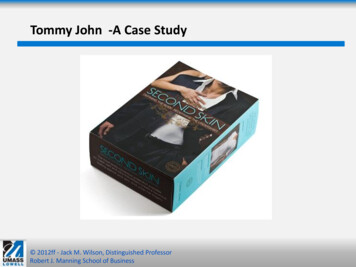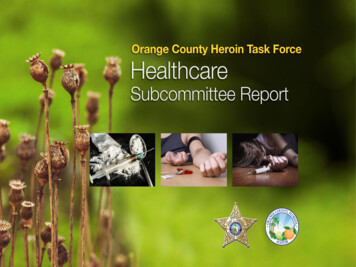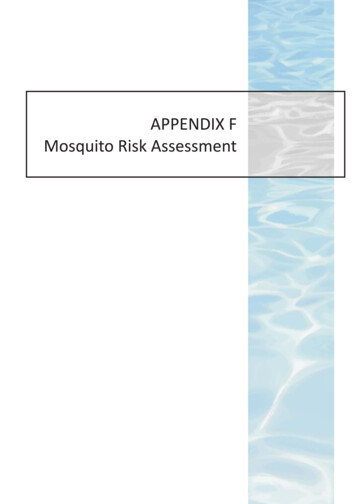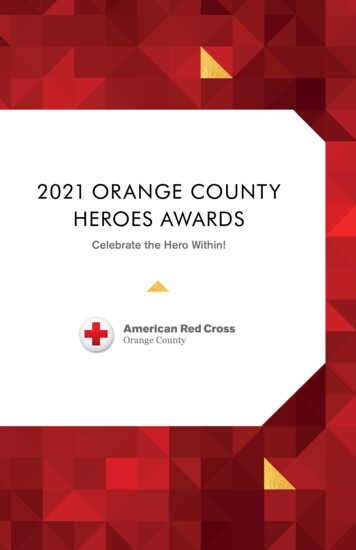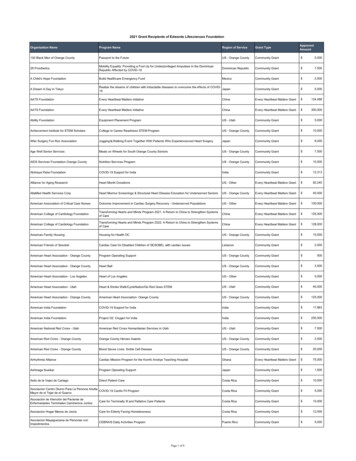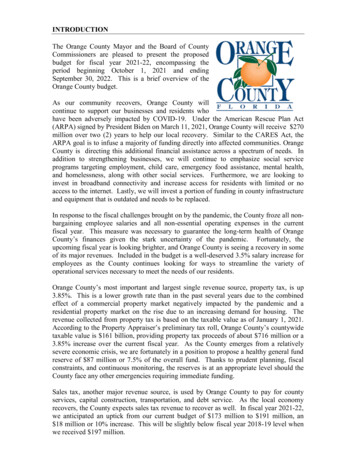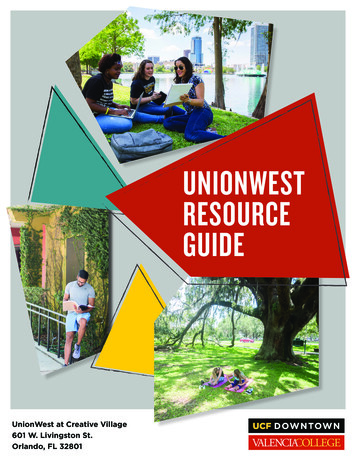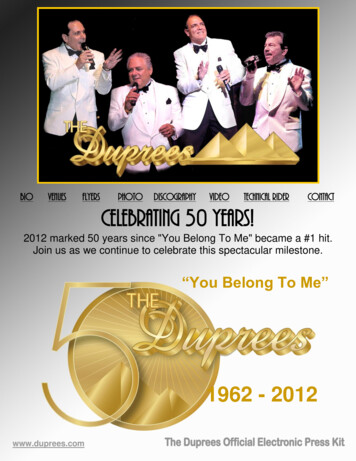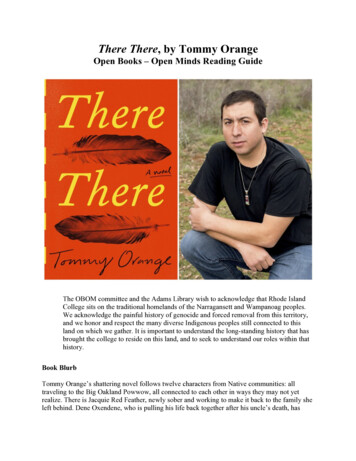
Transcription
There There, by Tommy OrangeOpen Books – Open Minds Reading GuideThe OBOM committee and the Adams Library wish to acknowledge that Rhode IslandCollege sits on the traditional homelands of the Narragansett and Wampanoag peoples.We acknowledge the painful history of genocide and forced removal from this territory,and we honor and respect the many diverse Indigenous peoples still connected to thisland on which we gather. It is important to understand the long-standing history that hasbrought the college to reside on this land, and to seek to understand our roles within thathistory.Book BlurbTommy Orange’s shattering novel follows twelve characters from Native communities: alltraveling to the Big Oakland Powwow, all connected to each other in ways they may not yetrealize. There is Jacquie Red Feather, newly sober and working to make it back to the family sheleft behind. Dene Oxendene, who is pulling his life back together after his uncle’s death, has
come to work at the powwow to honor his memory. Fourteen-year-old Orvil has come toperform traditional dance for the very first time. Together, this chorus of voices tells of the plightof the urban Native American—grappling with a complex and painful history, with aninheritance of beauty and spirituality, with communion and sacrifice and heroism. Hailed as aninstant classic, There There is at once poignant and laugh-out-loud funny, utterly contemporaryand always unforgettable. (from the publisher)Tommy Orange was also raised in the Oakland area, and the author has said that he identifieswith all 12 of his characters in one way or another. In this novel, Orange confronts themesimportant to contemporary Native Americans, such as generational trauma and life as a NativeAmerican in an urban setting. In addition, the novel explores many other concepts: storytellingand its importance to Native American culture; coincidence, fate, and the interconnectedness ofall things; violence; substance abuse and addiction; personal identity versus cultural identity; theconcept of home. (from BookRiot )Biographical DetailsTommy Orange is a recent graduate from the MFA program at the Institute of American IndianArts. He is a 2014 MacDowell Fellow, and a 2016 Writing by Writers Fellow. He is an enrolledmember of the Cheyenne and Arapaho Tribes of Oklahoma. He was born and raised in Oakland,California, and currently lives in Angels Camp, California.Awards & Accolades for There There2019 Finalist, Pulitzer Prize in Fiction2019 Hemingway Fountain/PEN Award2019 Anisfield-Wolf Book Award for Fiction2018 One of the New York Times 10 Best Books of the Year2018 Center for Fiction First Novel Prize2018 National Book Critics Circle Award's John Leonard Prize for First Book by a New VoiceThere There reached number 1 on the San Francisco Chronicle’s best-seller list, and number 8on The New York Times Best Seller listMediaAlexander Alter, “Tommy Orange's 'There There' Is a New Kind of American Epic,” New YorkTimes, May 31, 2018, nge-there-therenative-american.htmlJim Ruland, “Tommy Orange adjusts to all the attention as a ‘There There’ sequel flows along,”LA Times, November 21, 2019, tory/201911-21/tommy-orange-there-there-sequel
Allusions in the Title“There There” by Radiohead, from the album Hail to the Thief (2003)https://www.youtube.com/watch?v 7AQSLozK7aAIn pitch darkI go walking in your landscapeBroken branchesTrip me as I speakJust 'cause you feel itDoesn't mean it's thereJust 'cause you feel itDoesn't mean it's thereThere's always a sirenSinging you to shipwreck(Don't reach out, don't reach outDon't reach out, don't reach out)Steer away from these rocksWe'd be a walking disaster(Don't reach out, don't reach outDon't reach out, don't reach out)Just 'cause you feel itDoesn't mean it's there(Someone on your shoulderSomeone on your shoulder)Just 'cause you feel itDoesn't mean it's there(Someone on your shoulderSomeone on your shoulder)There thereWhy so green and lonely?And lonely, and lonely?Heaven sent you to meTo me, to me?We are accidents waitingWaiting to happenWe are accidents waitingWaiting to happenAbout the song, Thom Yorke (songwriter and lead singer for Radiohead) has said that the songwas “supposed to be comforting – ‘It's alright, you're just imagining it.’” The subtitle “The BonyKing of Nowhere” refers to an episode of the animated series Bagpuss, which Yorke watchedwith his young son.
Gertrude Stein, on Oakland in Everybody’s Autobiography (1937)“. what was the use of my having come from Oakland it was not natural to have come fromthere yes write about it if I like or any- thing if I like but not there, there is no there there.” (298)Themes & Recurring ImageryReflections (in mirrors, TVs, screens): see pages 15-16, 63, 68, 84, 118, 121-22, 159-60Spiders (myths of Veho the spider trickster, spider legs)Stories & StorytellingNamesCast of CharactersPrologueIn the dark timesWill there also be singing?Yes, there will also be singing.About the dark times.— Bertolt BrechtWe’ve been defined by everyone else and continue to be slandered despite easy-to-look-up-onthe-internet facts about the realities of our histories and current state as a people. We have allthe logos and mascots. The copy of a copy of an Indian in a textbook. All the way from the topof Canada, the top of Alaska, down to the bottom of South America, Indians were removed, thenreduced to a feathered image. Our heads are on flags, jerseys, and coins. Our heads were on thepenny first, of course, the Indian cent, and then on the buffalo nickel, both before we could evenvote as a people—which, like the truth of what happened in history all over the world, and likeall that spilled blood from slaughter, are now out of circulation. (7)Some of us grew up with stories about massacres. Stories about what happened to our people notso long ago. How we came out of it. They did more than kill us. They tore us up. Mutilatedus. It was a celebration. (8)Getting us to cities was supposed to be the final, necessary step in our assimilation, absorption,erasure, the completion of a five-hundred-year-old genocidal campaign. But the city made usnew, and we made it ours. We didn’t get lost amid the sprawl of tall buildings, the stream ofanonymous masses, the ceaseless din of traffic. We found one another, started up Indian Centers,brought out our families and powwows, our dances, our songs, our beadwork. (8-9)We did not move to cities to die. The sidewalks and streets, the concrete, absorbed our heaviness.The glass, metal, rubber, and wires, the speed, the hurtling masses—the city took us in. We werenot Urban Indians then. This was part of the Indian Relocation Act, which was part of the IndianTermination Policy, which was and is exactly what it sounds like. Make them look and act likeus. Become us. And so disappear. But it wasn’t just like that. Plenty of us came by choice, tostart over, to make money, or for a new experience. (9)
Plenty of us are urban now. If not because we live in cities, then because we live on the internet.(9)They used to call us sidewalk Indians. Call us citified, superficial, inauthentic, culturelessrefugees, apples. An apple is red on the outside and white on the inside. But what we are is whatour ancestors did. How they survived. We are the memories we don’t remember, which live inus, which we feel, which make us sing and dance and pray the way we do, feelings frommemories that flare and bloom unexpectedly in our lives like blood through a blanket from awound made by a bullet fired by a man shooting us in the back for our hair, for our heads, for abounty, or just to get rid of us. (10)Urban Indians were the generation born in the city. We’ve been moving for a long time, but theland moves with you like memory. An Urban Indian belongs to the city, and cities belong to theearth. Everything here is formed in relation to every other living and nonliving thing from theearth. All our relations. (11)Cities form in the same way as galaxies. (11)[B]ut nothing is original, everything comes from something that came before, which was oncenothing. Everything is new and doomed. (11)Being Indian has never been about returning to the land. The land is everywhere or nowhere.(11)Part I: RemainHow can I not know today your face tomorrow, the face that is there already or is being forgedbeneath the face you show me or beneath the mask you are wearing, and which you will onlyshow me when I am least expecting it?— Javier MaríasTony LonemanMost people don’t have to think about what their faces mean the way I do. Your face in themirror, reflected back at you, most people don’t even know what it looks like anymore. (16)Reflection question: What, how, and why do our faces mean things to others?Dene OxendeneDene puts his headphones on, shuffles the music on his phone, skips several songs and stays on“There There,” by Radiohead. The hook is “Just ‘cause you feel it doesn’t mean it’s there.” (29)About his storytelling project, Dene says:“Anyway, I asked some Indian people who’ve lived in Oakland for a while and some that justgot here not too long ago a two-part question, actually it’s not a question, I tried to get them totell me a story. I asked them to tell me a story about how they ended up in Oakland, or if they
were born here, then I asked what it’s been like living in Oakland. I told them the question ismeant to be answered in story form, whatever that means to them is okay, then I left the room. Idecided to do it confessional style so it’s almost like they’re telling the story to themselves, or toanyone and everyone behind the lens.” (32)“You know what Gertrude Stein said about Oakland?” Rob says.Dene shakes his head no but actually knows, actually googled quotes about Oakland whenresearching for his project. He knows exactly what the guy is about to say.“There is no there there,” he says in a kind of whisper, with this goofy openmouthed smile Denewants to punch. Dene wants to tell him he’d looked up the quote in its original context, in herEverybody’s Autobiography, and found that she was talking about how the place where she’dgrown up in Oakland had changed so much, that so much development had happened there, thatthe there of her childhood, the there there, was gone, there was no there there anymore. Denewants to tell him it’s what happened to Native people. (38-39)Opal Viola Victoria Bear Shield“Why do we got names like we do?” I said.“They come from old Indian names. We had our own way of naming before white people cameover and spread all those dad names around in order to keep the power with the dads.” (46)“You gotta know about the history of your people. How you got to be here, that’s all based onwhat people done to get you here. Us bears, you Indians, we been through a lot. They tried to killus. But then when you hear them tell it, they make history seem like one big heroic adventureacross an empty forest. There were bears and Indians all over the place. Sister, they slit all ourthroats.” (51)Edwin Black“Native American Indian,” this weird politically correct catchall you only hear from whitepeople who’ve never known a real Native person. I use Native, that’s what other Nativepeople on Facebook use. (69)I wrote my thesis on the inevitable influence of blood quantum policies on modern Nativeidentity, and the literature written by mixed-blood Native authors that influenced identity inNative cultures. All without knowing my tribe. Always defending myself. Like I’m not Nativeenough. I’m as Native as Obama is black. It’s different though. For Natives. I know. I don’tknow how to be. Every possible way I think that it might look for me to say I’m Native seemswrong. (71-72)Part II: ReclaimA feather is trimmed, it is trimmed by the light and the bug and the post, it is trimmed by littleleaning and by all sorts of mounted reserves and loud volumes. It is surely cohesive.— Gertrude Stein
Jacquie Red FeatherShe’d recently read an article that called the number of suicides in Native communitiesstaggering. For how many years had there been federally funded programs trying to preventsuicide with billboards and hotlines? It was no wonder it was getting worse. You can’t sell life isokay when it’s not. (98)In her head she heard her mom say, “The spider’s web is a home and a trap.” And even thoughshe never really knew what her mom meant by it, she’d been making it make sense over theyears, giving it more meaning than her mom probably ever intended. (101)Orvil Red Feather“Listen, baby, it makes me happy you want to know, but learning about your heritage is aprivilege. A privilege we don’t have. And anyway, anything you hear from me about yourheritage does not make you more or less Indian. Don’t ever let anyone tell you what being Indianmeans. Too many of us died to get just a little bit of us here, right now, right in this kitchen. You,me. Every part of our people that made it is precious. You’re Indian because you’re Indianbecause you’re Indian.” (119)He’s waiting for something true to appear before him—about him. It’s important that he dresslike an Indian, dance like an Indian, even if it is an act, even if he feels like a fraud the wholetime, because the only way to be Indian in this world is to look and act like an Indian. To be ornot to be Indian depends on it. (122)InterludeWe made powwows because we needed a place to be together. Something intertribal, somethingold, something to make us money, something we could work toward, for our jewelry, our songs,our dances, our drum. We keep powwowing because there aren’t many places where we get toall be together, where we get to see and hear each other.We all came to the Big Oakland Powwow for different reasons. The messy, dangling strands ofour lives got pulled into a braid—tied to the back of everything we’d been doing all along to getus here. We’ve been coming for miles. And we’ve been coming for years, generations, lifetimes,layered in prayer and handwoven regalia, beaded and sewn together, feathered, braided, blessed,and cursed. (135)Our bumpers and rear windows are covered with Indian stickers like We’re Still Here and MyOther Vehicle Is a War Pony and Sure You Can Trust the Government, Just Ask an Indian!;Custer Had it Coming; We Do Not Inherit the Earth from Our Ancestors, We Borrow It from OurChildren; Fighting Terrorism Since 1492; and My Child Didn’t Make the Honor List, but SheSure Can Sing an Honor Song. (135-36)We are Indians and Native Americans, American Indians and Native American Indians, NorthAmerican Indians, Natives, NDNs and Ind’ins, Status Indians and Non-Status Indians, FirstNations Indians and Indians so Indian we either think about the fact of it every single day or wenever think about it at all. We are Urban Indians and Indigenous Indians, Rez Indians andIndians from Mexico and Central and South America. We are Alaskan Native Indians, NativeHawaiians, and European expatriate Indians, Indians from eight different tribes with quarter-
blood quantum requirements and so not federally recognized Indian kinds of Indians. We areenrolled members of tribes and disenrolled members, inelligible members and tribal councilmembers. We are full-blood, half-breed, quadroon, eighths, sixteenths, thirty-seconds. Undoablemath. Insignificant remainders. (136)The wound that was made when white people came and took all that they took has never healed.An unattended wound gets infected. Becomes a new kind of wound like the history of whatactually happened became a new kind of history. All these stories that we haven’t been telling allthis time, that we haven’t been listening to, are just part of what we need to heal. Not that we’rebroken. And don’t make the mistake of calling us resilient. To have not been destroyed, to nothave given up, to have survived, is no badge of honor. Would you cann an attempted murdervictim resilient? (137)This is the thing: If you have the option to not think about or even consider history, whether youlearned it right or not, or whether it even deserves consideration, that’s how you know you’re onboard the ship that serves hors d’oeuvres and fluffs your pillows, while others are out at sea,swimming or drowning, or clinging to little inflatable rafts that they have to take turns keepinginflated, people short of breath, who’ve never even heard of the words hors d’oeuvres or fluff.(137-38)If you were fortunate enough to be born into a family whose ancestors directly benefited fromgenocide and/or slavery, maybe you think the more you don’t know, the more innocent you canstay, which is a good incentive to not find out, to not look too deep, to walk carefully around thesleeping tiger. Look no further than your last name. Follow it back and you might find your linepaved with gold, or beset with traps. (139)We didn’t have last names before they came. When they decided they needed to keep track of us,last names were given to us, just like the name Indian itself was given to us. (139)Dene Oxendene[Dene] “That’s what I’m trying to get out of this whole thing. All put together, our stories.Because all we got right now are reservation stories, and shitty versions from outdated historytextbooks. A lot of us live in cities now. This is just supposed to be like a way to start telling thisother story.”[Calvin] “I just don’t think it’s right for me to claim being Native if I don’t know anything aboutit.”“So you think being Native is about knowing something?”“No, but it’s about a culture, and a history.” (149)Part III: ReturnPeople are trapped in history and history is trapped in them.— James Baldwin
Opal Viola Victoria Bear ShieldShe lives by a superstition she would never admit to. It’s a secret she holds so tight to her chestshe never notices it. (160)Opal and Jacquie’s mom never let them kill a spider if they found one in the house, or anywherefor that matter. Her mom said spiders carry miles of web in their bodies, miles of story, miles ofpotential home and trap. She said that’s what we are. Home and trap. (163)Octavio Gomez[Sixto] “She [my grandma] told me I had something in me I wasn’t gonna be able to get out thistime around. She told me I could handle it like a man. Die with it. But that I could also share itwith family. I could give it away over time. Even to strangers. It was some old dark leftoverthing that stayed with our family. Some people get diseases passed down in their genes. Somepeople get red hair, green eyes. We got this old thing that hurts real fucking bad, makes youmean. That’s what you got. That’s what your grandpa had in him. Be a man, she told me. Keep itto yourself.” (181)“We got bad blood in us,” Sixto said. “Some of these wounds get passed down. Same with whatwe owe. We should be brown. All that white you see that you got on your skin? We gotta pay forwhat we done to our people.” (182)[Fina] “Long time ago they didn’t have a name for the sun.” She pointed up to the sun, whichwas in front of us. “They couldn’t decide if it was a man or a woman or what. All the animalsmet about it, and a badger came out of a hole in the ground and called out the name, but as soonas he did, he ran. The other animals came after him. That badger went underground and stayedthere. He was afraid they would punish him for naming it.” “Some of us got this feeling stuckinside, all the time, like we’ve done something wrong. Like we ourselves are something wrong.Like who we are deep inside, that thing we want to name but can’t, it’s like we’re afraid we’ll bepunished for it. So we hide. We drink alcohol because it helps us feel like we can be ourselvesand not be afraid. But we punish ourselves with it. The thing we most don’t want has a way oflanding right on top of us. That badger medicine’s the only thing that stands a chance at helping.You gotta learn how to stay down there. Way deep down inside yourself, unafraid.” (185)Part IV: PowwowA man must dream a long time in order to act with grandeur, and dreaming is nursed in darkness.— Jean GenetBlue“There’s a secret war on women going on in the world. Secret even to us. Secret even though weknow it,” Geraldine says. (202)
Thomas Frank[About his limp] Is it really some Native-specific countercultural thing you’re going for? Somevaguely anti-American movement? Or do you only walk the way your dad walked because genesand pain and styles of walking and talking get passed down without anyone even trying? (214)The chip you carry has to do with being born and raised in Oakland. A concrete chip, a slab,really, heavy on one side, the half side, the side not white. As for your mom’s side, as for yourwhiteness, there’s too much and not enough there to know what to do with. You’re from a peoplewho took and took and took and took. And from a people taken. You were both and neither.When you took baths, you’d stare at your brown arms against your white legs in the water andwonder what they were doing together on the same body, in the same bathtub. (216)Quotations from the end of the novel are intentionally omitted to avoid plot spoilers.
Topics for ResearchNative American cultures, traditions, and ritualsNativismNative Americans in Rhode IslandGenocide of Native AmericansNative American names and naming practicesNative American reservationsNative Occupation of AlcatrazUrban LifeRefugeesBordersColonialismExile, Loss, and DislocationSelf and OtherRace, ethnic, national, & class identitiesIntersectionalityHuman RightsDrug and substance abuseAddiction and RecoveryDisabilityStorytellingCreative Writing and CultureAmerican HistoryGenderSelf-DeterminationRebuilding
GuidesAdams Library Lib Guidehttps://library.ric.edu/therethereAfter reading the full novel, you might be interested in these reflections on the ending (and thebook as a whole) here: n Plans and Resources from the Free book/obop20/docs/there-there-curriculum.pdfBook Riot (Questions below are taken from this source, with some ub-questions/1. There There starts with a prologue: a nonfiction essay about the Native American experience.Similarly, there’s a nonfiction interlude on pages 134–141. Why do you think the author openedwith this prologue and included the interlude? And how did it inform your reading of the novel?2. Of the 12 central characters the novel follows, were there some storylines that you enjoyed orcared about more than the others? If so, what about those characters made their story stand out?3. Why do you think Tommy Orange chose to tell this story from so many differentperspectives? And why were some told from a first person perspective while others were thirdperson? Was it ever challenging to follow so many storylines before they began to converge?4. In an interview with Read it Forward, author Tommy Orange had this to say about the conceptof home: “I love the word home because it feels good to say it when you feel it, and it can meanso many different things and places and people. Home is moveable, replaceable, and malleable.Home can mean so many different things to so many different people, but once you know whathome is for you, it can’t be replaced by anything.” Does his opinion of home here align with theexploration of the meaning of home within the book? What do you think Orange is trying to sayabout “home” in There There?5. How do gender roles factor into this novel? And why are there so many matriarch characters(Maggie, Maxine, and Opal, for instance)?6. Although this has become a cliché phrase, it really does hold true for There There: the settingis a character. What role does the city of Oakland play in this story and in these characters’ lives?7. There is a scene in the novel that references the song “There There” by Radiohead (29), and ofcourse the novel is named There There as well. What connections, if any, can be made to the
themes of the novel and the Radiohead song Tommy Orange references? What about thereference to Gertrude Stein’s comment about Oakland that “there is no there there” (38)?8. Spiders are referenced throughout the novel and seem to be an important motif. What dospiders represent for these characters, and why does Tommy Orange keep returning to theimages of spiders? From tattoos of spiderwebs to finding spider legs inside of you, what does itall mean?9. Throughout this story, all of the characters wrestle in one way or another with what it means tobe Native American. What conclusions do they come to by the end of the novel? Do thesecharacters reach similar conclusions, or do they all seem to have very different conceptions oftheir identities as Native Americans in the end?10. In what ways is violence an important theme in this story, and what is Tommy Orange tryingto say about violence? How did you feel about the violence at the end of the story whencharacters converge at the pow wow? What was the purpose of having everyone’s storyculminate in this way?Loved There There, and want to read more? While Tommy Orange does not have another bookout yet, he did recommend the following books by indigenous authors in an article for The NewYork Times: The Heartbeat of Wounded Knee: Native America from 1890 to the Present byDavid Treuer, Empire of Wild by Cherie Dimaline, and Eyes Bottle Dark with a Mouthful ofFlowers by Jake Skeets.If you’re looking for more suggestions for new books by indigenous authors, check out this list.
2018 One of the New York Times 10 Best Books of the Year 2018 Center for Fiction First Novel Prize 2018 National Book Critics Circle Award's John Leonard Prize for First Book by a New Voice There There reached number 1 on the San Francisco Chronicle's best-seller list, and number 8 on The New York Times Best Seller list Media
